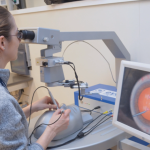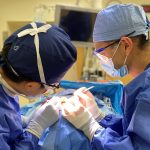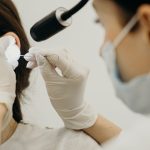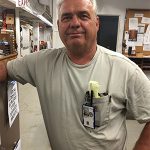The Harvard Ophthalmology Residency Training Program at Mass Eye and Ear is one of the most sought after and well-respected programs in the country. Focus spoke with PGY-5 Senior Resident Dr. Margot Weinert about her experience as a resident and the unique benefits of the program.
1. How did you become interested in ophthalmology?
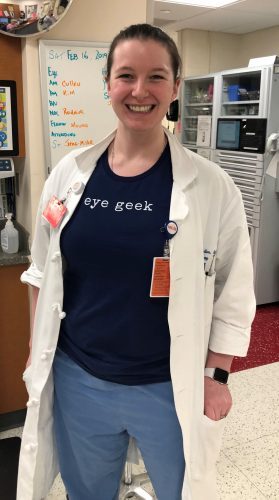
My path to ophthalmology was one of luck and happenstance. After deciding to apply to medical school, one of the few shadowing opportunities available was with the local ophthalmology department at Yale School of Medicine. There, I got a taste of what an ophthalmology clinic was like.
Then, in my senior year of college, I took a seminar on “Landmark Papers in Cellular Biology” and learned about Dr. Jean Bennett’s successful gene therapy trials for treatment of a genetic eye disease. This blew my mind, as I thought that was something of the distant future. Gene therapy as it relates to eye disease sparked my scientific interest in ophthalmology. When the opportunity arrived to take an ophthalmology elective in medical school, I jumped at the chance.
2. Why did you apply to the Harvard Ophthalmology Residency Training Program?
There were several things right from the start that made me interested in the Harvard Ophthalmology Program. First, we have a large residency class (eight per year)—I loved the idea of having a large cohort of residents and friends with which to share my experience.
I also loved that the program gives residents experience in all specialties, from comprehensive ophthalmology to retina to pediatrics, which forms a well-rounded education.
Coming from the Midwest, I enjoy how Boston has all the big-city amenities, but a more neighborhood feel.
The ophthalmology-specific emergency department at Mass Eye and Ear is a definite draw as well! It’s the only 24/7 emergency department for urgent and emergent eye problems in all of New England.
Ultimately, once I had my interview, it was the people who convinced me that this was the place for me. I found them to be open, honest, team-oriented and grounded, which is exactly what I wanted to shape my educational career.
3. What makes our Ophthalmology Residency Training Program unique from other academic programs across the country?
The program has several exciting features. The Emergency Department at Mass Eye and Ear is one of only a handful of its kind in the whole country. This makes up the foundation of our clinical education in a way that stimulates long-lasting learning. You jump from a retina tear to a corneal ulcer to multiple cranial nerve palsies, but they all start as patients coming in without a diagnosis. It’s a unique and an essential experience for residents. When we finish our first year, we are ready to encounter anything.
We also offer a surgical curriculum that is centered in early exposure. Residents are in the operating room (OR) in their intern and junior residency years and complete primary cataract surgery by the end of their intermediate residency year. We learn step-by-step so by our senior year we’re prepared to perfect cataract surgery, rather than learn cataract surgery. Additionally, we get great surgical exposure in the other subspecialties.
Last, but certainly not least, is our educational leadership. From the chair of our department through our program director and chief resident, we have amazing role models who went through the Mass Eye and Ear residency experience themselves. I never doubt that my best interests and education are always at the forefront of their decision making.
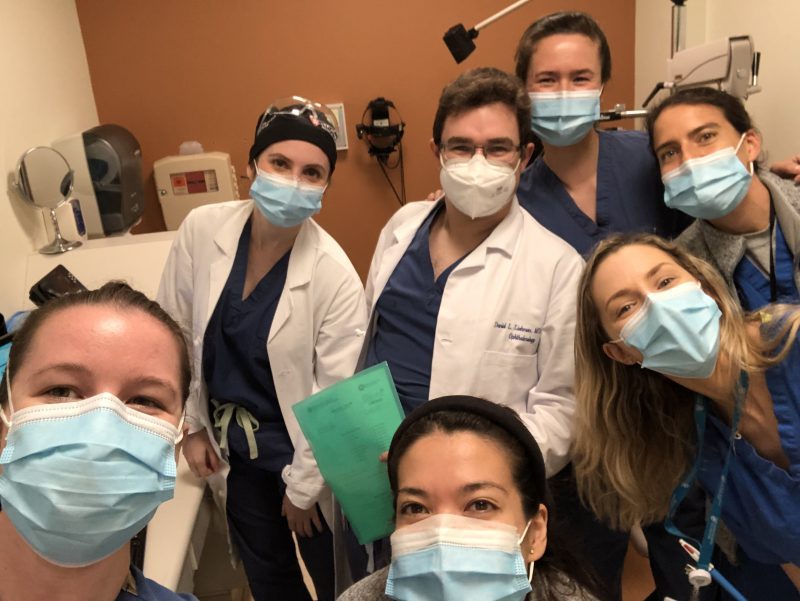
4. What is your day-to-day routine like?
As a senior resident, I’m rotating through various ophthalmology subspecialty services. Our rotations are structured so that we work with different attending physicians in their clinics and ORs. For example, one week I’m rotating on the Retina Service at Mass Eye and Ear. I’ll be in the clinic seeing ocular oncology patients, in the ORs for the treatment of retinal detachments and epiretinal membranes, and then in post-operative clinics to ensure recovery is going well. I work closely with both attendings and fellows to learn as much as I can.
5. As a resident, you help provide emergency room and in-patient consults at our other affiliate hospitals. What has that experience been like?
Although our home base is Mass Eye and Ear, because we are the Ophthalmology Residency Program at Harvard Medical School, we provide ophthalmology coverage at all the Harvard affiliates. This includes Mass General Hospital (MGH), Brigham and Women’s Hospital, Beth Israel Deaconess Medical Center, Boston Children’s Hospital, as well as our local VA Hospital in Jamaica Plain, where we care for our veteran population.
Every site has its own atmosphere, patient population, and learning opportunities that makes each unique. For instance, when we rotate at the Brigham, there is no onsite ophthalmology clinic. This gives residents an opportunity to learn independence and get really good at bedside examinations. MGH is connected to Mass Eye and Ear via a bridge, so we can often transfer patients between hospitals for consultations and surgery.
Boston Children’s Hospital is our primary pediatric ophthalmology experience, where we learn about pediatric eye exams and work closely with a team of sub-specialists to treat routine and very rare pediatric ophthalmic diseases.
6. Can you share one of your favorite moments since joining the program?
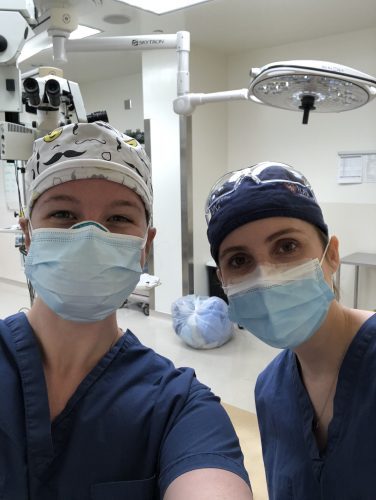
Everyone’s residency is filled with milestones. I have a distinctive memory from my junior year where I first felt like an ophthalmologist. I remember walking into the Mass Eye and Ear Emergency Department with one of my new teachers, Dr. Jane Schweitzer. She turned to me and said, “Just give it three months. In three months, you will have seen and learn more than many community ophthalmologists will in their whole career.”
I didn’t believe her at the time, but it was a reassuring statement. Fast forward four months and I’m on the phone with a community ophthalmologist of 20 years going through our protocol for evaluating and treating a traumatic hyphema (blood inside the eye). After that phone call, I turned to Dr. Schweitzer and said, “You were right!” The learning curve is steep, but that feeling of being a “real ophthalmologist” for the first time will always stick with me.
7. What are your plans after completing your residency training?
I am very excited to step into the role of Chief Resident for the 2021-2022 academic year. I’ll be working closely with residency education leadership, surgical teachers and administration to serve as a resident advocate and mentor. After my chief residency year, I’m hoping to complete a pediatric ophthalmology fellowship.
Learn more about the Harvard Ophthalmology Residency Training Program and follow our residents on Instagram for a behind-the-scenes look at the resident experience.
